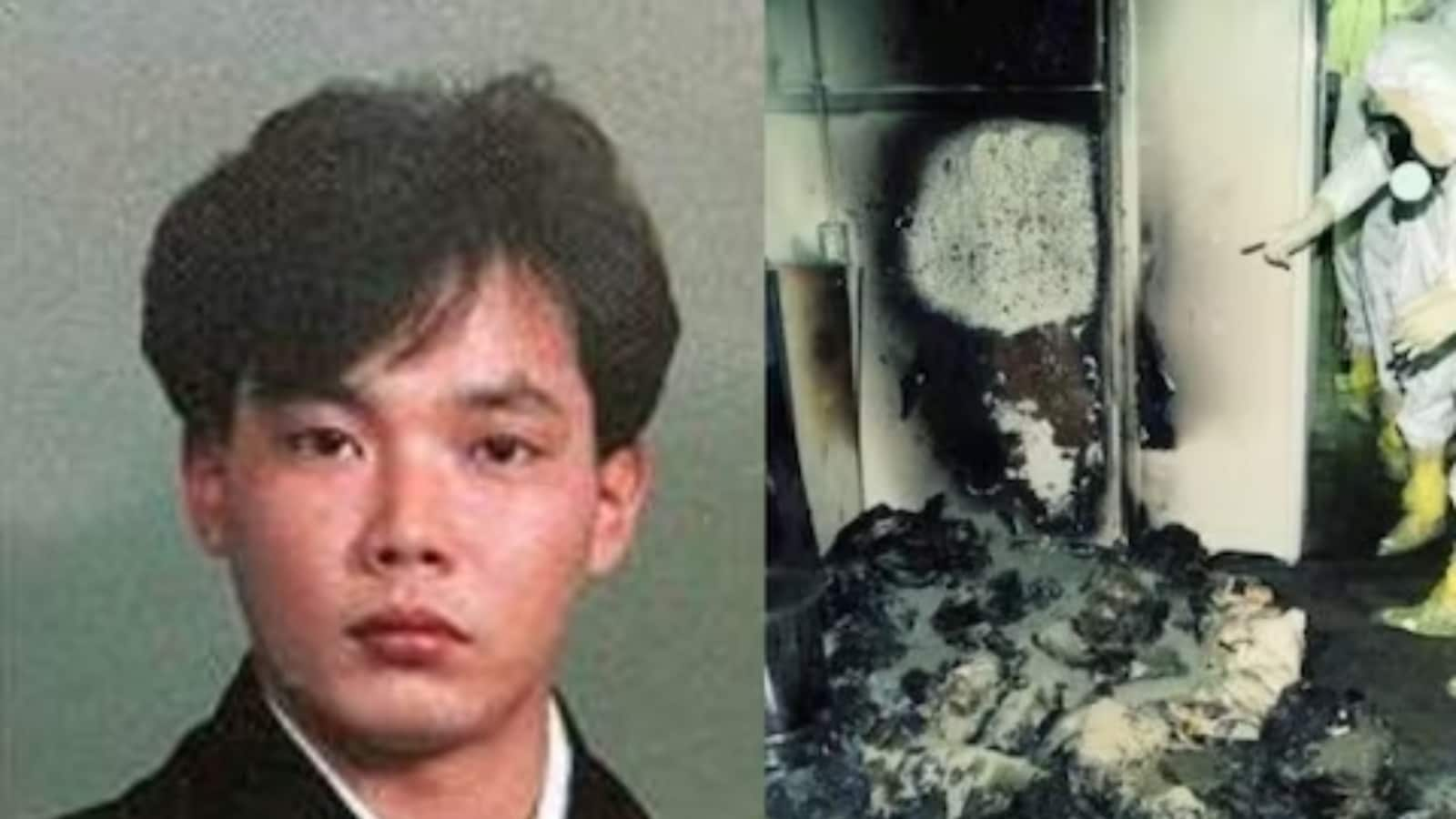Hisashi Ouchi: The Tragic Story Behind The Iconic Photo
In the realm of tragic events, few stories resonate as painfully as that of Hisashi Ouchi, a man whose life was forever altered by a catastrophic accident. Hisashi Ouchi's story is not only a testament to the fragility of human life but also a cautionary tale about the hazards of working with nuclear materials. The photo associated with Hisashi Ouchi has become an emblem of both tragedy and resilience. In this article, we will delve into the details of Hisashi Ouchi's life, the incident that led to his suffering, and the broader implications of his story.
Born on March 19, 1966, in Japan, Hisashi Ouchi was a dedicated worker at the Tokaimura nuclear facility. His life took a devastating turn on September 30, 1999, when a criticality accident occurred due to improper handling of nuclear fuel. This incident resulted in severe radiation exposure, leading to catastrophic health consequences for Ouchi and two of his colleagues. The subsequent media coverage and the haunting image of Ouchi in the hospital have sparked discussions about nuclear safety and the ethical responsibilities of employers.
This article aims to provide an in-depth exploration of Hisashi Ouchi's life, the criticality accident, the aftermath of the incident, and the ongoing discussions surrounding nuclear safety. Join us as we navigate through this complex narrative, shedding light on the importance of safety protocols and the human stories behind the statistics.
- Tyreek Hills Kids A Deep Dive Into The Life Of The Nfl Stars Family
- Unlocking The Magic Nicki Minajs Contribution In P Diddys Hello Good Morning Lyrics
Table of Contents
- 1. Biography of Hisashi Ouchi
- 2. The Nuclear Incident
- 3. Aftermath of the Accident
- 4. Medical Treatment and Challenges
- 5. Public Awareness and Reactions
- 6. Nuclear Safety Protocols
- 7. Lasting Impact and Legacy
- 8. Conclusion
1. Biography of Hisashi Ouchi
Hisashi Ouchi was born in a small town in Japan, where he lived a relatively normal childhood. He was known for his hard work and dedication, which eventually led him to a position at the Tokaimura nuclear facility.
| Data Pribadi | Detail |
|---|---|
| Nama Lengkap | Hisashi Ouchi |
| Tanggal Lahir | 19 Maret 1966 |
| Tempat Lahir | Jepang |
| Pekerjaan | Pekerja di fasilitas nuklir Tokaimura |
| Tanggal Kecelakaan | 30 September 1999 |
2. The Nuclear Incident
The criticality accident that changed Hisashi Ouchi's life occurred on September 30, 1999, due to a series of human errors and procedural violations during the handling of uranium fuel. The facility was not following the required safety protocols, leading to a dangerous accumulation of nuclear material.
During the incident, Ouchi and his colleagues were exposed to an intense burst of radiation. The event was not immediately recognized as critical, which delayed the emergency response and ultimately exacerbated the severity of their injuries.
- Discovering Fred Gwynne The Multifaceted Talent Behind The Classic Characters
- How Many Kids Does Jason Momoa Have A Complete Guide To His Family
Key Facts About the Incident:
- Date: September 30, 1999
- Location: Tokaimura Nuclear Facility, Japan
- Cause: Improper handling of uranium fuel
- Immediate Effects: Severe radiation exposure
3. Aftermath of the Accident
The aftermath of the Tokaimura incident was dire. Ouchi suffered from acute radiation syndrome, which led to extensive medical treatment and a long, painful battle for survival. The incident not only affected his health but also raised alarm bells about nuclear safety protocols in Japan.
Ouchi was hospitalized for several months, undergoing numerous treatments and procedures in an attempt to mitigate the damage caused by radiation exposure. His condition was critical, and he faced numerous challenges, including infections and organ failure.
4. Medical Treatment and Challenges
Hisashi Ouchi's medical treatment involved several complex procedures aimed at addressing the effects of radiation exposure. The medical team faced significant challenges in treating Ouchi due to the nature of his injuries.
Challenges Faced During Treatment:
- High Infection Risk: Ouchi's immune system was severely compromised.
- Organ Failure: Multiple organs began to fail due to radiation damage.
- Pain Management: Ouchi experienced extreme pain, requiring constant management.
5. Public Awareness and Reactions
The incident garnered significant media attention, raising public awareness about the dangers associated with nuclear energy. Hisashi Ouchi's story became a focal point for discussions about workplace safety and the ethical responsibilities of employers in the nuclear industry.
Many people were shocked by the severity of Ouchi's condition, particularly the haunting images that emerged from his hospital stay. These images served as a stark reminder of the potential consequences of negligence in handling nuclear materials.
6. Nuclear Safety Protocols
In the wake of the Tokaimura incident, there was a nationwide push for stricter nuclear safety protocols in Japan. Regulatory bodies implemented new measures to prevent similar accidents in the future, emphasizing the importance of rigorous training and adherence to safety guidelines.
New Safety Measures Implemented:
- Regular Safety Audits: Enhanced inspections of nuclear facilities.
- Mandatory Training: Comprehensive training programs for all employees.
- Emergency Response Drills: Regular drills to prepare for potential accidents.
7. Lasting Impact and Legacy
The legacy of Hisashi Ouchi extends beyond his tragic story. His experience has sparked important conversations about nuclear safety, worker rights, and the ethical implications of nuclear energy. The incident served as a wake-up call for the industry, highlighting the need for a culture of safety and accountability.
Furthermore, Ouchi's story continues to resonate with those who advocate for workers' rights, emphasizing the importance of protecting employees in high-risk industries.
8. Conclusion
Hisashi Ouchi's story is a poignant reminder of the human cost associated with industrial accidents, particularly in the nuclear sector. The tragic incident at the Tokaimura facility has had lasting repercussions, prompting significant changes in safety protocols and raising awareness about the need for stringent regulations.
As we reflect on this narrative, it is crucial to advocate for safety and accountability in all industries. We encourage readers to engage in discussions about workplace safety and share their thoughts in the comments below. Together, we can work towards a safer future for all.
Thank you for taking the time to explore the story of Hisashi Ouchi with us. We hope that this article has provided valuable insights and encourages ongoing conversations about the importance of safety in high-risk industries.



Detail Author:
- Name : Alva Kutch Sr.
- Username : carlo.haag
- Email : kenna64@osinski.com
- Birthdate : 1994-12-28
- Address : 8077 Beier Villages Port Nyahbury, UT 95530-7231
- Phone : 463.386.8818
- Company : Miller, Pfeffer and Ferry
- Job : Dredge Operator
- Bio : Consectetur qui esse voluptatem iure. Qui natus aliquam dolores quod. Cumque ad velit qui corporis pariatur. Sed aut illum officiis quo.
Socials
instagram:
- url : https://instagram.com/macey_frami
- username : macey_frami
- bio : Molestias magnam ad commodi omnis. Magni qui omnis corrupti saepe.
- followers : 1671
- following : 404
linkedin:
- url : https://linkedin.com/in/framim
- username : framim
- bio : Id est tenetur quae corrupti.
- followers : 4477
- following : 1076
tiktok:
- url : https://tiktok.com/@macey_frami
- username : macey_frami
- bio : Ipsa incidunt a expedita dolorem nihil consequuntur at odit.
- followers : 2676
- following : 2727
facebook:
- url : https://facebook.com/maceyframi
- username : maceyframi
- bio : Recusandae laboriosam mollitia omnis et ex.
- followers : 3575
- following : 2583
twitter:
- url : https://twitter.com/maceyframi
- username : maceyframi
- bio : Officia quis aut sint consectetur iusto. Quisquam perspiciatis minus minima placeat. Earum debitis itaque eos quia.
- followers : 5261
- following : 1933